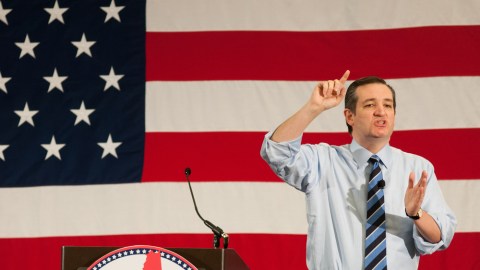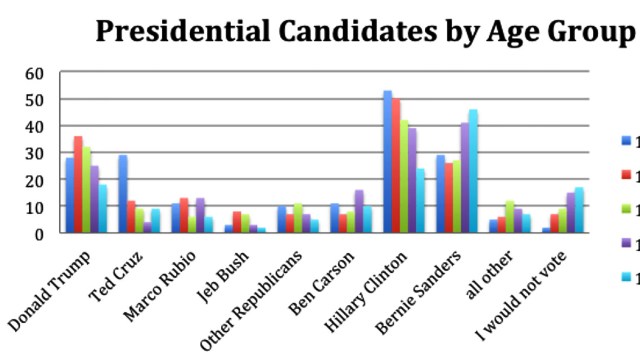Why Are the Loudest Among Us Also the Most Insecure?

Watching the Republican debate last Thursday was, like chapters past, a pertinent lesson in vitriol and fear. This year’s debates are the rubbernecking of the modern political process: the more mangled and disastrous a crash, the more we gawk. The contest has become little more than trying to bark the loudest and show whose fangs are sharpest.
From Ted Cruz’s elaboration on the effectiveness of carpet-bombing (all the while swiping at Barack Obama) to Marco Rubio’s apparent dozen-Red Bull cocktail pre-gaming to Jeb Bush claiming his father is the greatest man alive, these debates are the human equivalent of chimp pantgrunting. And with the alpha male absent from the stage, the rest of the gang took no issue in ganging up on Cruz.
This is not to say that national security is not important. It is an essential point of discussion for both parties. The religiosity with which it is approached by the GOP, alongside the sanctimoniousness each candidate displays, is exploiting a cultural weakness, however. By towing the line of Manifest Destiny that has infected the American brain for centuries, we’re merely reaching for an unrealistic apex from an unfathomable gorge.
In Global Brain, Howard Bloom discusses the differences between Spartan and Athenian societies. Sparta was effectively ruled by dictators (or at least had a dictatorial culture) for much of its vaunted history. Progressive Athens enjoyed cosmopolitanism. Athens was no slouch in terms of warriorship, but when it came to the military, Sparta, with its genetic selection (men were expected to pass along their wives if they found more manly men) and intensive focus on battle, organized its affairs around warfare.
It’s not a surprise that Republicans are playing the Spartan card. Bloom writes,
“Rome chose Athenian democracy in the centuries of its rise, then switched to Spartan harshness when it faced barbarian onslaught and decline. The chaos of the Dark Ages triggered a retreat to Sparta’s fortresslike mentality.”
Empires no longer rise and fall over centuries. America’s power is not exactly waning — our military checkbook remains relatively boundless — but, like all superpowers before us, there will be a day of reckoning.
Research shows that being an alpha male wears on the immune system: Chimp leaders exhibit elevated levels of cortisol. America the alpha country is both oblivious to its major cracks — the worst environmental disaster since the BP oil spill is barely getting attention; Al Jazeera covered the Flint disaster nearly a year before mainstream press picked up on it — and fundamentalist in its demands of greatness.
Ignorance and urgency make for a toxic cocktail. Alpha Donald Trump has laid out no pertinent plan for much of anything, but his genius is in exploiting our penchant for Spartanism. Facts are irrelevant. The media is a paid arm of the government. Even the religious mostly overlooked his “2 Corinthians” gaffe. Build a wall along the Canadian border as well; their French-inspired socialist tendencies could be a future danger.
What’s most interesting about this fiasco is not that Trump and Cruz, an establishment figure the establishment loathes, are leading. The outsider has been breathing down the necks of this two-party system for decades. Their ascensions were inevitable. What might be unique is that this display of Spartan bigotry and violence is a self-inflicted wound. It is happening because of democracy, not in spite of it.
Lycurgus was communing with the Oracle at Delphi when penning the Spartan Constitution. The three mystical virtues of his culture became equality among Spartan citizens (though not outsiders), austerities, and military fitness. It is a very Republican agenda, even if such equality is reserved for a portion of the electorate.
America likes to tout its democracy as being the best in the world. While there is dismay on both sides of the aisle, democracy is playing out like never before. Even “both sides” was a design failure. Until the 1970s the Democratic and Republican parties chose their candidate. Democracy only happened between their choices. Iowa’s sacredness is a mere 44 years old, but it did kick off a truer democratic electoral process.
Yet within those small spheres less democratic voices reign. Bloom points out that those who are the most fundamentalist are also the least confident. I’ve known religious people that are impossible to provoke. Their faith is a matter of introspection. It is the uncertain and overly sensitive — those that feel that American values are being stolen even when no such robbery exists — that feel the need to scream the loudest.
Manifest Destiny cannot exist without a creator promising such a destiny. In the 19th century, this philosophy fueled the murder of countless Native Americans and the implementation of impoverished wages to low-class workers in building our nation’s infrastructure. The same attitude prevails today in security, immigration, religion, and beyond. All of this is rooted in a deep fear that America will one day no longer be the alpha — a much more likely destiny than an infinity of domination.
Recent research shows that the more thunderous a monkey’s scream, the smaller his testicles. Democracy might not be pretty, but it certainly is loud.
—
Image: Andrew Kline
Derek Beres is a Los Angeles-based author, music producer, and yoga/fitness instructor. Follow him on Twitter @derekberes.




